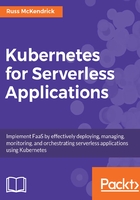
Project Seven
In 2014 Joe Beda, Brendan Burns, and Craig McLuckie were joined by Brian Grant and Tim Hockin on Project Seven.
This project, named after the Star Trek character Seven of Nine, aimed to make a friendlier version of Borg. By the time of the first commit, the project had an external name, Kubernetes.
You can see the first commit at https://github.com/kubernetes/kubernetes/commit/2c4b3a562ce34cddc3f8218a2c4d11c7310e6d56 and the first really stable release, which came four months later, can be found at https://github.com/kubernetes/kubernetes/releases/tag/v0.4.
Initially, the aim of Kubernetes was to take everything Google had learned from Borg and running its large container clusters and open source it as a way of attracting customers to Google's own public Cloud Platform—which is why you may still find reference to the project's original GitHub page at https://github.com/GoogleCloudPlatform/kubernetes/.
However, by the time of its 1.0 release in July 2015, Google had seen that it had quickly become much more than that and they joined the Linux Foundation, Twitter, Intel, Docker, and VMware (to name a few) in forming the Cloud Native Computing Foundation. As part of this new partnership, Google donated the Kubernetes project as the foundation of the new group.
Since then, other projects have joined Kubernetes, such as:
- Prometheus (https://prometheus.io/), originally developed by SoundCloud, is a time series database that can be used to store metrics
- Fluentd (https://www.fluentd.org/) is a data collector that allows you to take data from many different sources, filter or normalize it, and then route it to a storage engine such as Elasticsearch, MongoDB or Hadoop (to name a few)
- containerd (http://containerd.io/) is an open-source container runtime originally developed by Docker to implement Open Container Initiative standards
- CoreDNS (https://coredns.io/) is a DNS service built entirely on plugins, meaning that you can create DNS services that traditionally would be extremely complex to configure
As well as this, new members such as AWS, Microsoft, Red Hat, and Oracle are all lending their support and resources to the foundation's projects.